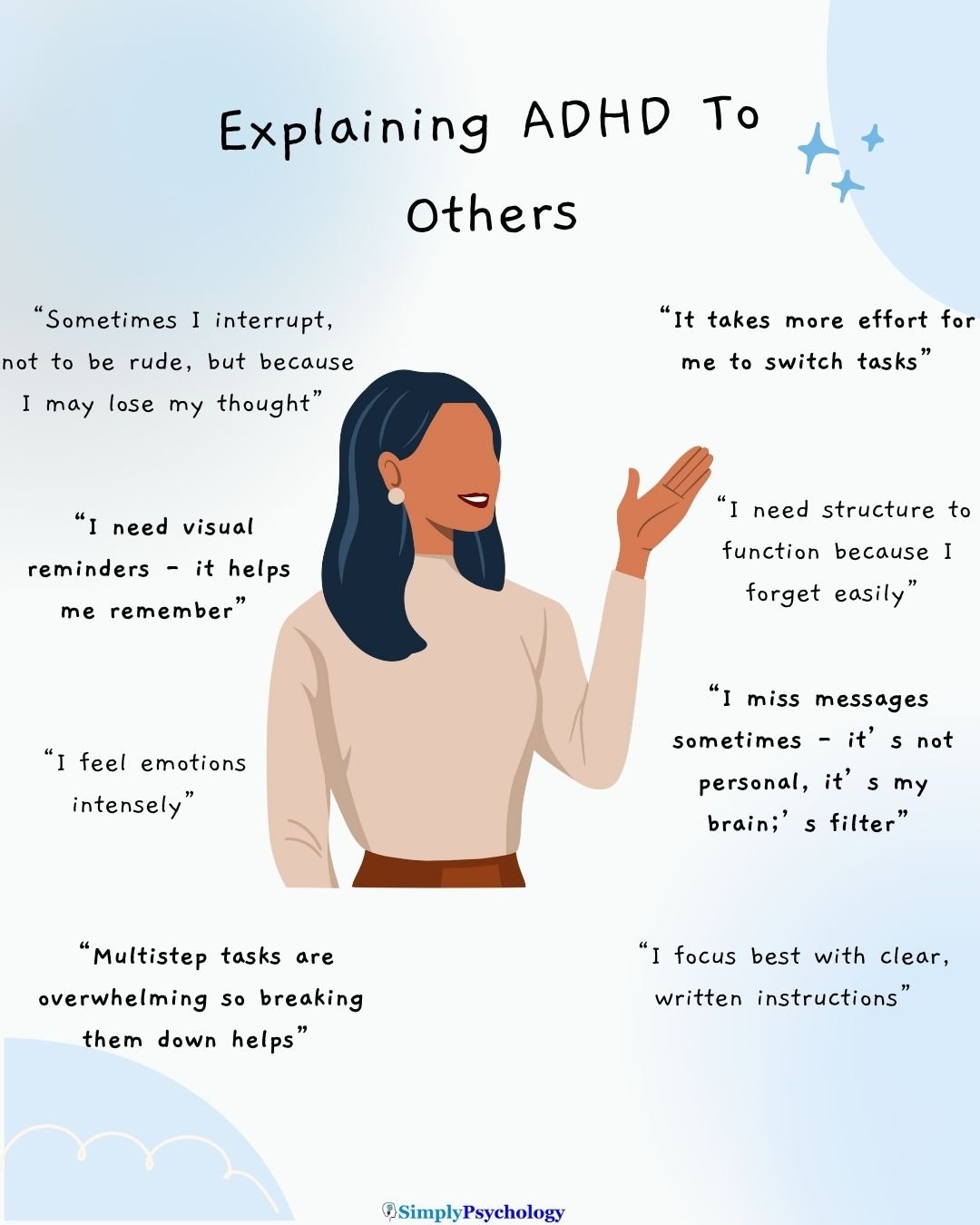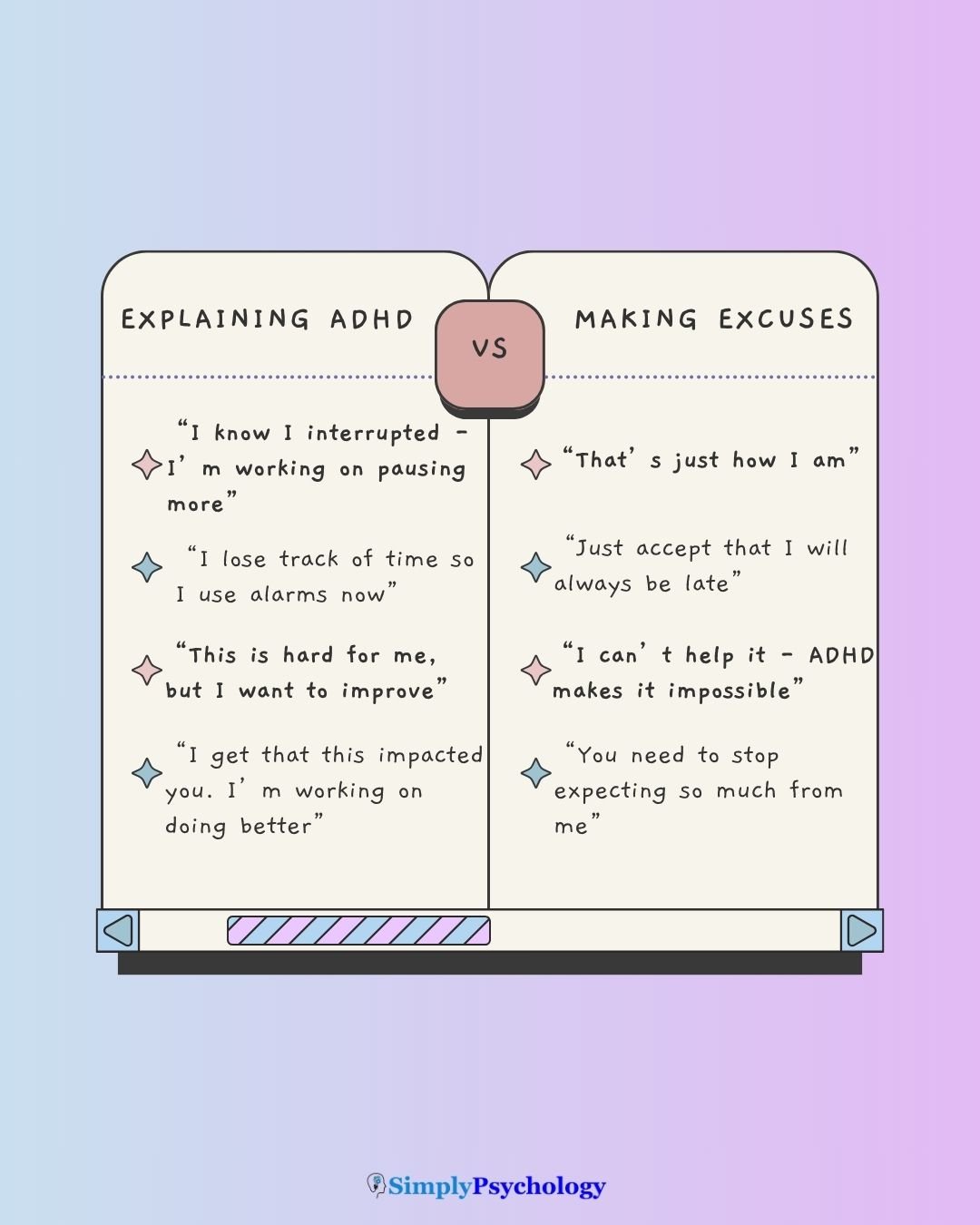Explaining your ADHD to someone can feel daunting. You might worry that mentioning your challenges will sound like “making excuses” instead of being taken seriously.
Many people with ADHD feel misunderstood and walk a tightrope between saying nothing (and being misjudged) or speaking up (and risking eye-rolls). It’s a frustrating bind that often leads to guilt and silence.
ADHD also brings unique hurdles in communication. For one, many people with ADHD experience rejection sensitivity, meaning they are extra fearful of criticism or dismissal, which can make them hesitant to share.

Emotional regulation issues common in ADHD can amplify anxiety when trying to explain themselves. The result? They may either over-explain and sound defensive, or say nothing and kick themselves later.
The good news is that you can talk about your ADHD openly and honestly without falling into the “excuse” trap. This article will show you how to explain your ADHD traits with honesty and accountability — without shame or self-blame.
Why It Feels Like “Making Excuses” (When It’s Not)
There’s a lingering stigma that makes any mention of ADHD seem like an “excuse.” Society still carries misconceptions like “ADHD isn’t real” or “everyone gets distracted, so what’s the big deal?”
For example, some insist ADHD is “just an excuse for laziness” – a myth that couldn’t be further from the truth. Such attitudes can make you internalize shame and feel like you have to justify every slip-up.
In reality, ADHD is a genuine neurodevelopmental condition with well-documented brain-based causes. Dr. Cesar Ochoa-Lubinoff, a neuropsychologist, explains that ADHD is “hardwired” and often runs in families. In other words, it’s not a character flaw or a made-up excuse.
Psychologist J. Russell Ramsay, Ph.D. – an ADHD specialist – notes that adults with ADHD typically put in “twice the effort for half the result” when trying to meet their responsibilities. They’re not looking for an easy way out; they genuinely want to keep up and have some control over their lives.
But when you do explain your struggles, you might still fear others will hear “excuse” instead of context.
This creates a double bind: If you say nothing, you’re misunderstood. If you explain, you worry you’ll sound like you’re blaming ADHD. One person described it perfectly:
“I hate having to justify why I’m late or distracted — it makes me feel like I’m just making excuses.” – one person shared.
How to Talk About Your ADHD Traits Without Sounding Defensive
Finding the right words can help you share your ADHD experience confidently. The key is to speak honestly and matter-of-factly, without excessive apologies or defensiveness. Consider these guidelines:
- Use clear, non-apologetic language: Instead of over-apologizing, calmly explain the situation. For example: “I’m still learning how to manage this. Here’s how it affects me sometimes.” This frames ADHD as something you’re working on, not an excuse.
- Emphasize context, not blame: Make it clear you’re providing background, not avoiding responsibility. You can say plainly, “It’s not an excuse — it’s context for what I struggle with.”
- Acknowledge the impact on others: Showing you get it goes a long way. “I know my forgetfulness can be frustrating. I really want to get better at this,” validates their feelings while explaining yours. It demonstrates empathy and accountability at once.
- Show self-awareness (without self-shaming): You can own your challenge without belittling yourself. For instance: “This is something I’m working on, and I appreciate your patience as I figure it out.” You’re acknowledging the issue and your effort to improve.
Using language like the above keeps the tone honest and non-defensive. You’re not making excuses; you’re sharing real information about how your brain works, and you’re taking steps to manage it.
This helps the other person see the full picture – that ADHD creates certain challenges, and that you take responsibility for addressing them.
Scripts and Scenarios: What to Say in Real Life
It helps to have a few ready phrases for common situations. Here are some short, clear scripts you can use and adapt in different scenarios:
- With a partner: “When I forget to respond, it’s not that I don’t care. My brain’s working memory just drops things sometimes. I’m setting up better reminders because I know responding is important to you.”
- With a friend: “I know I jump topics a lot — my mind can be all over the place. I’m trying to stay more present, so feel free to nudge me if I get off track. I promise I won’t take it personally.”
- With a coworker or manager: “Time management is a real challenge for me with ADHD. I use calendar alerts and phone reminders to stay on top of things, but if a deadline is crucial, it helps me to have it in writing. I’m not making an excuse — I just want to make sure I meet expectations.”
- With a family member: “I realize I’ve forgotten chores or lost track of plans, and I know that’s frustrating. If I don’t write things down immediately, I will forget. Let’s put a whiteboard on the fridge so I can checklist what needs to be done — that way I’m accountable and we’re on the same page.”
Each of these scripts balances honesty about the ADHD trait with accountability and a solution. They explain the context (“here’s why this happens”), while also showing you care about the impact and are actively working to improve.
By calmly pointing out “this is how my brain works” and “here’s what I’m doing about it,” you invite the other person to understand rather than judge.
How to Stay Accountable Without Blaming Yourself
Having ADHD doesn’t mean you get to shrug off responsibilities — and most people with ADHD don’t want to.
You can hold yourself accountable for mistakes while avoiding the pitfall of toxic self-blame. It’s a delicate balance, but it’s doable.
Own the impact, but ditch the shame.
If you mess up (say you missed an appointment), acknowledge it and apologize if needed, but resist the urge to spiral into self-loathing.
There’s a difference between saying “I missed the deadline, and I’m sorry” versus “I’m useless and lazy.” One is accountability; the other is undeserved shame.
Remember, your ADHD-related slip-ups are behaviors to work on, not evidence of personal failure or lack of character.
Show that you’re actively managing your ADHD
For example, if you tend to forget things, mention that you’re using timers, to-do apps, or sticky notes to stay organized. Let others know you take your challenges seriously.
You might say, “I know I dropped the ball this time. I’ve started using a task app and daily reminders so it won’t happen again.” This signals: I’m not making excuses; I’m finding solutions.
It’s also okay to set boundaries about your needs
Sometimes you need to explain that you work differently and that’s okay. For instance, you might tell someone, “I’m not using ADHD to dodge blame. I want you to know why I struggle with this and what I’m doing to improve, because I do care about the outcome.”
Setting this kind of boundary makes it clear that you expect accountability from yourself, and you expect a bit of understanding from others in return.
What to Do When Someone Doesn’t Understand ADHD
Not everyone will “get” ADHD, no matter how well you explain. Some people respond with skepticism (“Everybody’s a little ADHD.”), minimization (“Sounds like an excuse to me.”), or impatience. These reactions can trigger our own defensiveness or hurt, so it’s important to stay calm and clear.
Remember that such responses usually come from ignorance. Try not to take it personally. Respond with a short, factual clarification.
If someone scoffs, you might say calmly: “I’m not asking for a free pass — I’m just trying to explain what’s behind these challenges.”
Or if they say “just try harder,” you can reply: “I do try — very hard. It’s not about willpower; it’s about how my brain is wired, and I’m working on strategies that help.”
Keeping your cool and sticking to the facts gives the other person a chance (however small) to rethink their assumptions.
“My brother said I ‘needed a medical excuse to be lazy’ — hearing that was infuriating,” one forum user wrote.
Sadly, some people may never validate your experience. In those cases, decide whether it’s worth educating them or if it’s healthier to disengage. You are not obligated to convince every skeptic.
Here are a few tips for these tough interactions:
- Stay factual and calm: Avoid yelling or arguing. Just state your truth (“This is how my brain works”) as matter-of-factly as you can.
- Set boundaries: If they keep dismissing you, politely end the conversation (“Let’s agree to disagree.”). You’re not obliged to endure disrespect.
- Find support elsewhere: Talk to people who do get it (friends, support groups, a therapist). Don’t let one person’s ignorance make you doubt yourself.
Tips for Building Better Conversations Over Time
Talking about ADHD isn’t a one-and-done deal. It’s an ongoing dialogue, especially with those close to you. Here are some tips to make these conversations easier and more productive:
Choose the right moment
Timing matters. Don’t bring up your ADHD in the heat of an argument or when either of you is distracted. Pick a calm time when you both can focus.
Start with empathy and awareness
Begin by acknowledging their perspective. For example: “I know it frustrates you when I run late, and I want you to know I take that seriously.”
This shows you understand their feelings and sets a cooperative tone.
Invite their input
Make it a two-way conversation. Encourage them to share their feelings or ask questions.
“I want to hear your perspective, too. What things do you find hardest? Let’s talk about it,” can open the door to honest dialogue.
Be ready to listen without jumping to defend yourself.
Offer solutions together
Show you’re willing to find ways that work for both of you. For instance, “If keeping track of chores has been an issue, maybe we can use a shared app or calendar so we’re on the same page.”
Proposing a solution demonstrates that you’re proactive and care about the relationship, not just your own comfort.
When ADHD Is an Explanation — And When It’s Not
Let’s clarify a critical point: saying “this happened because of my ADHD” is not the same as saying “…so I’m not responsible.”
ADHD can explain why something went wrong, but it doesn’t excuse the effects of what happened. Neurodivergent or not, we all owe others respect and consideration.

For instance, if you blurt out something hurtful due to an ADHD-fueled impulse, ADHD may be the reason you slipped — but it doesn’t erase the hurt it caused. You still need to apologize and make amends.
In short: acknowledge your ADHD, but also own your actions. Using ADHD as a blanket excuse to ignore others’ feelings or to stop trying isn’t fair.
As one ADHD guide puts it, “this should not be used as an excuse to behave in a hurtful way, and accountability should still be taken.” In other words, ADHD is never a free pass to be inconsiderate.
On the flip side, having ADHD doesn’t mean you must punish yourself for every mistake. Hold yourself to the standard of trying to do better, not achieving perfection.
When you slip up, admit it and try to fix it; when you make progress, give yourself credit.
Bottom line:
Balance honesty about ADHD with accountability for your actions. Be upfront about how ADHD affects you, and show that you’re working to manage it.
By explaining your brain’s quirks while owning your behavior, you invite others to understand you without seeing it as an excuse. With practice, you can confidently say “Here’s what’s going on with me” – and build empathy and solutions instead of resentment.

